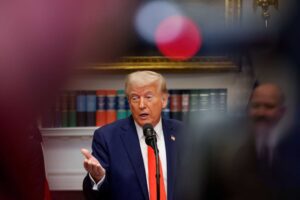The Trump administration is preparing to escalate its trade dispute with the UK by considering the use of a 91-year-old tax rule that would double tax rates on British firms operating in the United States — a move that experts warn could have a more severe impact than tariffs.
Known as Section 891 of the US Internal Revenue Code, the rule was introduced in 1934 and gives the president sweeping powers to raise taxes on US subsidiaries of foreign companies if their home governments are deemed to be discriminating against American businesses.
Though never before used, the Trump administration is now actively exploring the measure. On the first day of his second term, President Trump ordered officials to investigate which countries impose “discriminatory” taxes on US firms. That review has now been completed — and the UK is believed to be among the nations on the list, along with other OECD countries.
The warning comes just a week after the White House triggered a global trade shock with the announcement of up to 49% tariffs on dozens of countries, including a 10% blanket tariff on British goods. But tax specialists say the next front in the trade war could be even more damaging.
“That’s the next battle in the [trade] war, and potentially affects the UK much more than the tariffs,” said Tim Sarson, head of tax policy at KPMG UK. “We’re a services economy and this obviously affects service transactions as well.”
At the heart of the White House’s concerns are UK tax policies perceived to unfairly target American firms, particularly large tech companies. The UK’s Digital Services Tax, introduced in 2020, levies a 2% tax on UK revenues of tech firms generating more than £500 million globally. Many of the biggest firms caught by the tax are US-based.
Also under scrutiny is the UK’s undertaxed profits rule, part of the global OECD tax framework. This allows HMRC to apply a “top-up” tax on companies based in low-tax jurisdictions — including some US states — if they fall below the global 15% minimum tax rate.
In addition, the UK’s Diverted Profits Tax — often referred to as the “Google Tax”, introduced under former chancellor George Osborne — is seen as another sticking point. The measure targets firms that shift profits to low-tax countries despite having significant operations in the UK.
One senior US tax adviser with knowledge of the administration’s discussions said: “If any country was going to end up on the list, it was going to be the UK.”
The administration is also considering an additional measure — Section 899 — which would raise taxes incrementally by 5% each year, rather than doubling the rate immediately. While this is seen as less dramatic, its cumulative impact would still be significant for foreign firms operating in the US.
However, there remains legal uncertainty about whether these measures can be enforced unilaterally. The UK and US have existing tax treaties and trade arrangements that could override Sections 891 and 899. These agreements may offer protections against sudden increases in tax rates, though this could ultimately become a matter of legal interpretation and international diplomacy.
For UK-based businesses with substantial US operations — particularly in technology, finance and professional services — the threat of punitive taxation adds a fresh layer of uncertainty at a time when markets are already rattled by tariffs and rising geopolitical tensions.
If invoked, Section 891 would mark a significant escalation in the UK–US economic relationship, shifting the focus from goods trade to cross-border taxation of services and intellectual property.
As the situation evolves, business leaders and trade associations are likely to press the UK government to engage with Washington diplomatically — not only to avoid retaliatory taxes but to uphold investor confidence in UK firms operating abroad.
Read more:
US threatens to double tax rates on UK firms under obscure 91-year-old rule














